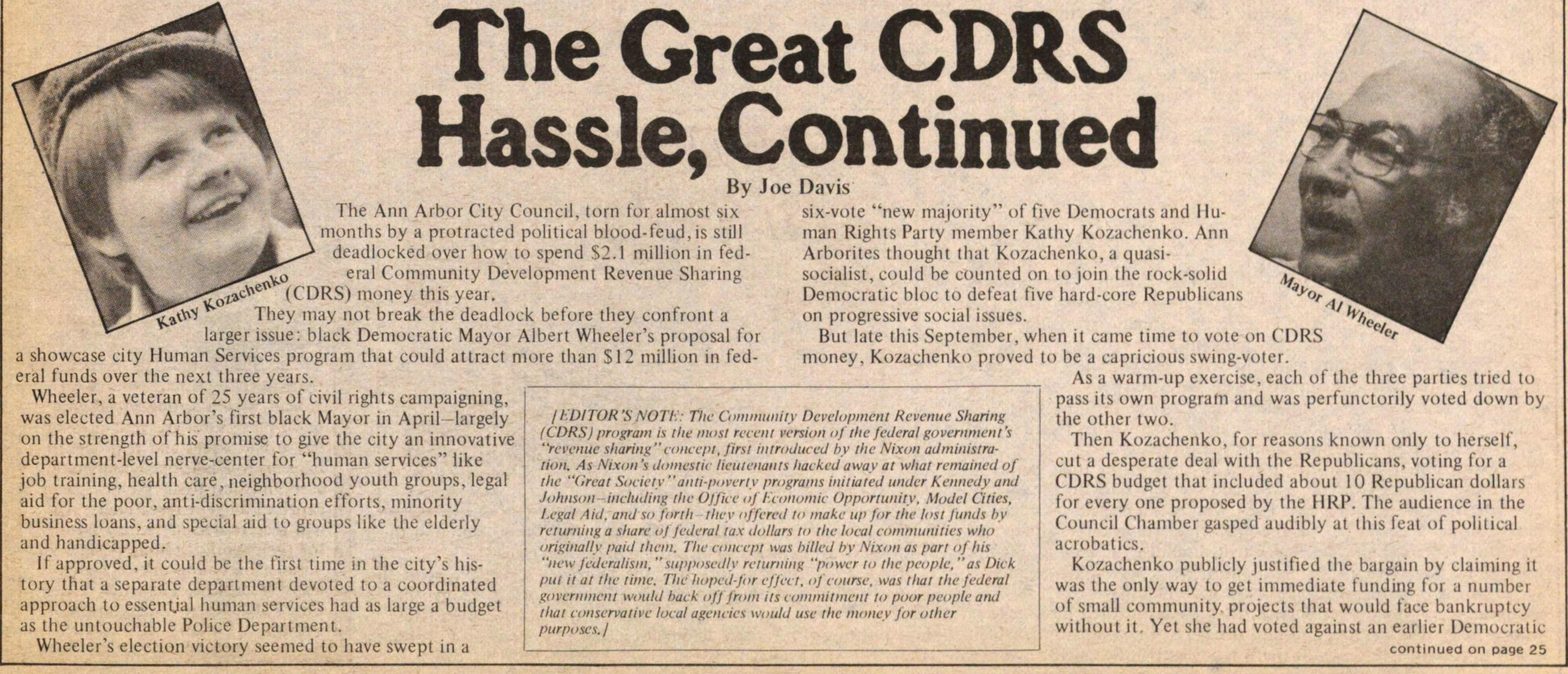The Great CDRS Hassle, Continued


By Joe Davis
The Ann Arbor City Council, torn for almost six months by a protracted political blood-feud, is still deadlocked over how to spend $2.1 million in federal Community Development Revenue Sharing (CDRS) money this year.
They may not break the deadlock before they confront a larger issue: black Democratic Mayor Albert Wheeler's proposal for a showcase city Human Services program that could attract more than $12 million in federal funds over the next three years.
Wheeler, a veteran of 25 years of civil rights campaigning, was elected Ann Arbor's first black Mayor in April—largely on the strength of his promise to give the city an innovative department-level nerve-center for "human services" like job training, health care, neighborhood youth groups, legal aid for the poor, anti-discrimination efforts, minority business loans, and special aid to groups like the elderly and handicapped.
If approved, it could be the first time in the city's history that a separate department devoted to a coordinated approach to essential human services had as large a budget as the untouchable Police Department.
Wheeler's election victory seemed to have swept in a six-vote new majority of five Democrats and Human Rights Party member Kathy Kozachenko. Ann Arborites thought that Kozachenko, a quasi-socialist, could be counted on to join the rock-solid Democratic bloc to defeat five hard-core Republicans on progressive social issues.
But late this September, when it came time to vote on CDRS money, Kozachenko proved to be a capricious swing-voter.
As a warm-up exercise, each of the three parties tried to pass its own program and was perfunctorily voted down by the other two.
Then Kozachenko, for reasons known only to herself, cut a desperate deal with the Republicans, voting for a CDRS budget that included about 10 Republican dollars for every one proposed by the HRP. The audience in the Council Chamber gasped audibly at this feat of political acrobatics.
Kozachenko publicly justified the bargain by claiming it was the only way to get immediate funding for a number of small community projects that would face bankruptcy without it. Yet she had voted against an earlier Democratic
continued on page 25
continued from page 3
proposal to give $475,000 in emergency CDRS money to 29 such hard-pressed projects.
Push had come to shove, and Wheeler swiftly vetoed the patchwork GOP-HRP compromise. But under a rarely used City Charter provision for mayoral vetoes, he let stand twenty line-item allocations totalling $341,309 for the most hard-pressed community projects. These projects will now get their money with no further delay.
Speculation over Kozachenko's motives was fueled by the inclusion of some agencies which had barely advanced past the idea stage and, furthermore, had not even applied for money.
Kozachenko, with the support of a strong radical feminist constituency within the HRP, won from the Republicans an increase of $40,000 in child care grants, $5,000 for Women's Non-Profit Enterprises, and $25,000 for the Women's Community Center.
The GOP-HRP compromise budgeted a total of $192,231 for child care. Of the 20 projects Wheeler passed for emergency funding, seven were daycare centers and two were women's projects. Back in February, Wheeler and the Democrats had proposed spending $400,000—more than twice the HRP-GOP amount—for child care.
HRP's One Night Stand
Council Republicans, for their part, made no attempt to hide their cynicism about exploiting Kozachenko's vote. The GOP-HRP alliance turned out to be a one night stand.
At the next regular Council session, Kozachenko moved passage of her own HRP budget for spending $1,023,229 of the CDRS money. Neither Republicans nor Democrats would second her motion; therefore, under Council 's rules, no discussion of it was in order. A five minute shouting match broke out when she decided to speak anyway, over the objections of Wheeler and other Democrats. A Democratic motion to recess the meeting until order could be restored failed to win a single Republican vote.
The Republicans wanted the public watching on local TV to hear a rousing HRP-Democratic dogfight. If they had no hopes of conquering, they could at least divide.
The incident was fairly typical of Republican tactics since Wheeler was elected on a platform of practical and progressive reform. The interests of low-income and minority groups had been consistently ignored during the previous Republican administration.
The Republicans, refusing for four months even to admit they had lost the election to the Democratic-HRP "coalition," tried to keep Wheeler back-pedalling with a drawn-out fight against certifying the election results; a court battle to overturn the city's new Preferential Voting law; continual threats of a recall campaign that always seemed to evaporate into thin air; and eye-gouging and ear-biting generally.
Possibly the lowest blow came when Council was considering the extension of nearly $2 million for Ann Arbor's old Model Cities program (a HUD program, aimed at developing minority and low-income neighborhoods). The Democratic-HRP "coalition" voted for the measure. Republicans charged Wheeler with "conflict of interest" in an attempt to make him abstain from the vote and thus kill Model Cities funding.
The "conflict of interest" charge proved so baseless and expedient that not even the Republicans publicly repeated it after the city attorney disallowed it and the GOP lost the vote.
Until another election sets things straight (and all three parties claim it will), Ann Arbor's present three-ring circus form of politics, complete with lion tamers, rule jugglers, promise swallowers, tightrope ballerinas, and more than one clown act, may well continue. Wheeler and progressive elements in City Council will be stuck with the unenviable job of trying to work within this context.
While Republican and HRP Councilmembers work the crowd for laughs and applause, someone must make hard, responsible, intelligent decisions about the use of CDRS money. If Ann Arbor, a relative Garden of Eden when it comes to urban problems, can't solve these issues, little success can be hoped for in New York, Los Angeles, or Detroit.
People vs. Property
The three parties' disagreement over how to spend the money goes to the very heart of their political philosophies.
• The Republicans had originally proposed spending about 50 per cent of the budget in its two largest categories—30 per cent on housing improvement and 20 per cent on community (read "human") services. Both the Democrats and the HRP originally agreed that an amount closer to 75 per cent should be spent in these two categories, where they saw the community 's most urgent human needs. The Democrats had argued back in February that 44 per cent should be spent in the human services category alone—more than twice what the Republicans were willing to spend.
• The biggest chunk of money in any party's housing allocation would go to enforcing Ann Arbor's building code and the effort to bring sub-standard housing up to the level of liveability already required by city law.
Under the austerity budget of the previous Republican administration, however, salaries for city building inspectors were cut, and many were laid off. The director of Ann Arbor's Building and Safety Department has stated in writing that his department does only a quarter of the inspections city law requires. Many have argued that the Republicans, strongly backed by landlords and rental property interests, simply don't want to enforce housing regulations.
• There is also debate over how Ann Arbor should spend federal money to create "public service" jobs for the unemployed under the Comprehensive Employment Training Act (CETA). Wheeler wants the Human Services program to coordinate use of both CETA and CDRS money; instead of hiring the unemployed to lean on shovels and rakes, he says, the salaries could be used to staff existing community service agencies that are struggling to do more work than they can handle.
The Republicans would put almost 20 per cent of the budget into a "Public Works" category—which includes some $250,000 for street resurfacing, $49,500 for curb and sidewalk repair, and $100,000 for new fire engines.
• The parties also differ on whether CDRS money should go toward major capital expenses—not just fire trucks, but land and buildings. Wheeler is not likely to support such expenditures until he sees how they fit into an overall long-term plan. Republicans say that using CDRS money to help the Summit Street and Free Peoples' Clinics buy the buildings they now rent would allow those agencies to be more certain of continued operation.
The Will of the GOP
The Republicans, of course, maintain that they speak for "the people." The people they mean, most of the time, are the Republican people on the Republican-appointed and Republican-controlled CDRS "Citizens' Committee," whose budget recommendations to Council they support to the penny.
The Citizens' Committee quickly became little more than a charade. Before long, many citizens stopped attending committee meetings in frustration, realizing that the Republicans had rigged the game. The 30-member committee's final recommendations to Council were passed by seven member voting yes, four voting no, and one abstaining. The rest of the "citizens" didn't even bother to attend.
This summer, Republicans waged a bitter publicity campaign against Democratic attempts to amend the Committee budget, accusing the opposition of violating the sacrosanct "will of the people." The GOP, however, ignored the Committee's recommendations in closing its deal with the HRP. The Republicans' continual invocation of the "will of the people," in fact, has been little more than a rhetorical trick to disguise their six-month campaign to reverse or nullify the results of April's mayoral election.
For a long time, the GOP drive succeeded in at least distracting attention from Wheeler's Human Services idea. But the last month of uproar and stalemate on Council seems to be driving home an important lesson: that none of the three parties can govern the city all by itself. Council members are quietly beginning to listen to one another.
Even Republicans maybe starting to hear Wheeler's serious proposals for a Human Services program. Councilperson Louis Belcher, for one, told the SUN last week he was "not opposed" in principle.
A number of Council working sessions may bring the parties closer to a nuts-and-bolts solution to the impasse. Before they are over, Mayor Wheeler's "dream" of a multi-million dollar city Human Services agency could be a good deal closer to reality.
Ann Arbor is just one of many bigger cities with CDRS dollars to spend. Some feel that CDRS will turn out to be the same bureaucratic boondoggle all over the country, just another pie for the politicians to slice up and sell for votes. But some Ann Arborites think they may still prove it ain't so in their town.
Joseph Davis is a free-lance writer who lives in Ann Arbor. He was formerly the workhorse reporter for Good Morning Michigan.
[EDITOR'S NOTE: The Community Development Revenue Sharing (CDRS) program is the most recent version of the federal government "revenue sharing" concept, first introduced by the Nixon administration. As Nixon's domestic lieutenants hacked away at what remained of the "Great Society" anti-poverty programs initiated under Kennedy and Johnson—including the Office of Economic Opportunity, Model Cities, Legal Aid, and so forth—they offered to make up for the lost funds by returning a share of federal tax dollars to the local communities who originally paid them. The concept was billed by Nixon as part of his "new federalism," supposedly returning "power to the people, as Dick put it at the time. The hoped-for effect, of course, was that the federal government would back off from its commitment to poor people and that conservative local agencies would use the money for other purposes.
Article
Subjects
Freeing John Sinclair
Old News
Ann Arbor Sun